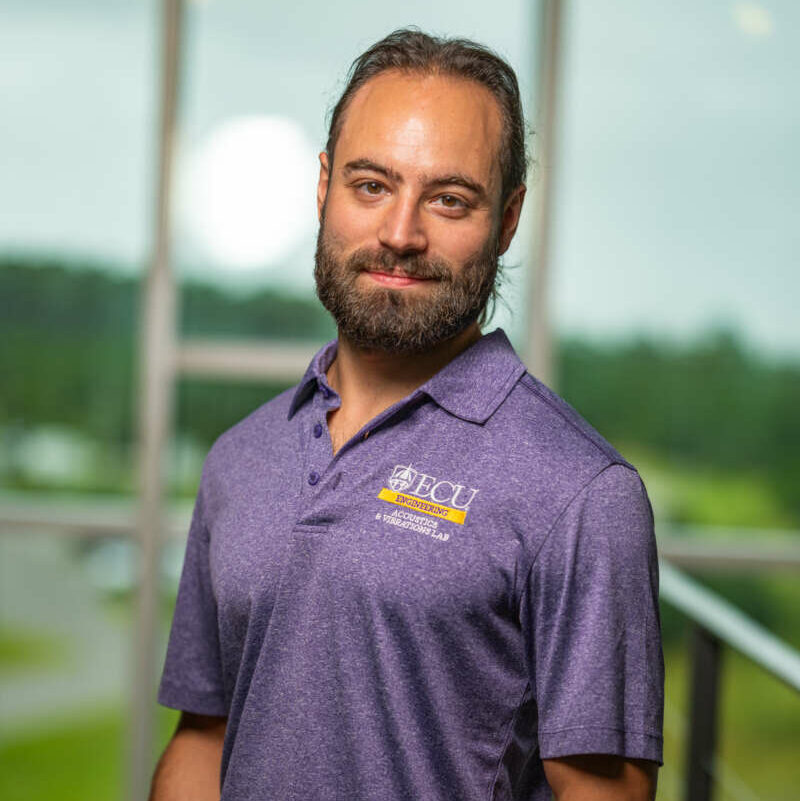
Andrea Vecchiotti, Ph.D.
Postdoctoral Scholar
Office: Room No. 368
850 NC 345, Wanchese, NC 27981
Phone: (252) 475-5432
Email: vecchiottia22@ecu.edu
Bio
Andrea is a postdoctoral scholar in the Ryan Acoustics and Vibrations Lab. He grew up on the Adriatic coast in Italy, where he completed his B.A. and M.S. degrees in Mechanical Engineering at the Università Politecnica delle Marche. Always passionate about music, in 2019 he moved to Washington, DC, to pursue a Ph.D. degree in Mechanical Engineering, with a specialization in Acoustics and Vibrations. After the completion of the degree, in 2022, he moved to the Outer Banks to continue his research on atmospheric acoustics. Andrea enjoys spending time outdoors, from hiking to surfing and playing sports, particularly soccer and volleyball.
Education
PhD., Mechanical Engineering, The Catholic University of America, Washington DC, May 2023
M.S., Mechanical Engineering, Università Politecnica delle Marche, Ancona IT, Dec 2018
B.A., Mechanical Engineering, Università Politecnica delle Marche, Ancona IT, Feb 2016
Research Interests
Atmospheric Acoustics: Numerical modeling and measurements of sound propagation from offshore sources. Studying and quantifying effects of sea waves, sand sound absorption, and meteorology on near-shore sound propagation in the atmosphere.
Publications
A. Vecchiotti, T. J. Ryan, F. Cobb, J. F. Vignola, D. Turo, “Investigation of engineering models for sound propagation in a near-shore environment.”, In: Applied Acoustics. 2022
T. J. Ryan, A. Vecchiotti, J. Foeller, F. Cobb, J. F. Vignola, D. Turo, “Synchronized acoustic and atmospheric measurement system for characterization of atmospheric sound propagation.”, In: Noise Mapping. 2022
A. Vecchiotti, T. J. Ryan, F. Cobb, N. Wilson, J. F. Vignola, D. Turo, “Acoustic modeling of a sandy beach for atmospheric sound propagation in a near-shore environment.”, In: Proceedings of Meetings on Acoustics (POMA). 2021
F. Cobb, N. Wilson, A. Vecchiotti, D. Turo, J. F. Vignola, T. J. Ryan “Characterization of acoustic properties of swash-zone sand for improved atmospheric acoustic modeling.”, In: Proceedings of Meetings on Acoustics (POMA). 2021
T. J. Ryan, F. Cobb, A. Vecchiotti, J. F. Vignola, D. Turo, “Near-shore acoustic transmission loss: a measurement approach.” In: Proceedings of Meetings on Acoustics (POMA). 2020


 Based at the Coastal Studies Institute (CSI), the North Carolina Renewable Ocean Energy Program (NCROEP) advances inter-disciplinary marine energy solutions across UNC System partner colleges of engineering at NC State University, UNC Charlotte, and NC A&T University. Click on the links below for more information.
Based at the Coastal Studies Institute (CSI), the North Carolina Renewable Ocean Energy Program (NCROEP) advances inter-disciplinary marine energy solutions across UNC System partner colleges of engineering at NC State University, UNC Charlotte, and NC A&T University. Click on the links below for more information. ECU's Integrated Coastal Programs (ECU ICP) is a leader in coastal and marine research, education, and engagement. ECU ICP includes the Coastal Studies Institute, ECU's Department of Coastal Studies, and ECU Diving and Water Safety.
ECU's Integrated Coastal Programs (ECU ICP) is a leader in coastal and marine research, education, and engagement. ECU ICP includes the Coastal Studies Institute, ECU's Department of Coastal Studies, and ECU Diving and Water Safety. The ECU Outer Banks campus is home to the Coastal Studies Institute.
The ECU Outer Banks campus is home to the Coastal Studies Institute.

